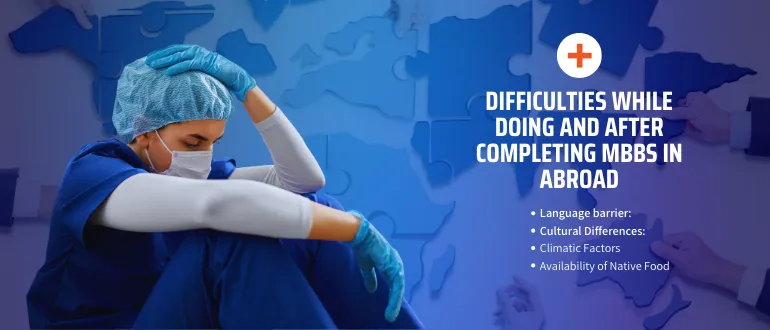
Medical profession has its ups and downs. But one thing that is remarkable about the profession is that it is highly reputed. Doing an MBBS from abroad is a challenge as it involves a lot of effort, consistency, and dedication from the student. A medical student's life is certainly not a smooth one. From 1st year to last year, a student goes through a lot of upheavals, and on overcoming all the hurdles, a student in the end comes out as a doctor.
When in a new country the first major hurdle is the language barrier. The language spoken in the country of your choice for doing MBBS can affect your education directly or indirectly. In order to study, in some countries, students have to spend almost a year learning the local language. In some countries, colleges will not start medical academics until the students learn the country's official language. The only way out of this is to choose a country that allows the entire syllabus in English language. This way the student will not have to spend time entirely learning a new language and can focus on more important aspects of Studying MBBS in Abroad, while at the same time improving their language proficiency using their free time.
Education abroad can feel overwhelming because of the customs and traditions of the locals. Culture shock is a phenomenon that affects many people when they are exposed to a new and different culture, which can be overwhelming and difficult to adjust to. Culture shock is the disorientation that a student can experience when they encounter unfamiliar values, customs, and behaviors in a foreign country. It is a normal part of the process of adapting to a new culture. Although it can be a challenging and unpleasant process, adapting to a new culture while studying MBBS Abroad opens the minds of students and also helps them build connections with peers and enhance their professional and personal growth.
The climatic factors in another country can also affect the student's stay in the country. Most students, especially those coming from Asian countries, are not accustomed to harsh climatic conditions. Countries like Russia are known for their winters. Students choosing to study MBBS in Russia can adapt to the climate by opting for suitable clothes depending on the climate conditions.
Availability of the type of food matters when deciding to stay in a country to study MBBS in Abroad. Since sometimes the university you may wish to apply to would not have an Indian food facility. In similar situations, the student will have to bear the extra cost of food during their stay in the country. So it is highly advisable to look if an Indian mess facility is available at your desired university. Without the availability of Indian food or comfort food at the university mess, the cost of residing in a foreign country will rise significantly.
After the completion of MBBS, students will have many options to choose from, that is they can go for higher studies to pursue various Postgraduate programs after MBBS from Abroad or start medical practice. After MBBS from Abroad for Indian students, foreign medical graduates will need to clear the Foreign Medical Graduate Examination (FMGE) in India, which is a difficult exam to crack. FMGE is to test the student’s eligibility and it is to verify that the education gained by foreign medical graduates is up to the mark with the National Medical Commission regulation.
Students are cleared to start medical practice in India upon successfully clearing the FMGE. Such are the difficulties the student might face if they choose the wrong university or country to study MBBS. These difficulties can be avoided if the student does their research and they can become a successful doctor.